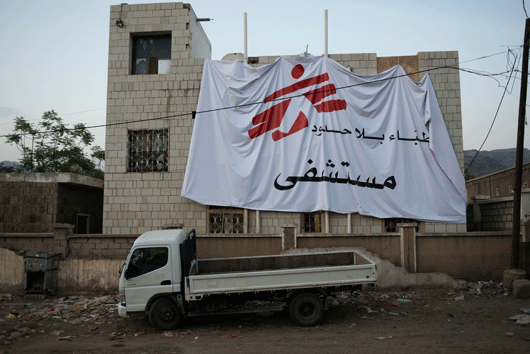
Local Editor
Yemen’s entire health system is crumbling after months of war, with people dying from lack of medical care even in areas where there is no fighting, said medical charity Medecins Sans Frontieres (MSF).
Before the conflict erupted in March last year, Yemen, one of the world’s poorest countries, relied heavily on foreign doctors and imported the bulk of its medical supplies, as well as food and fuel.
Foreign medical staff have since fled, and imports have fallen and become a lot more expensive.
"Even where there is no fighting, people are dying for lack of supplies, because the whole system itself is crumbling after a year of war," Karline Kleijer, MSF’s emergency coordinator for Yemen, said in a telephone interview.
In March 2015, the Hadi government fled to Saudi Arabia. A Saudi-led military coalition launched a campaign of air strikes and a ground offensive in an attempt to put back Abd Rabbu Mansour Hadi back to power.
The city of Taiz in the country’s west has experienced some of the fiercest fighting.
"The ceasefire does not make any difference (in Taiz)," said Kleijer, speaking from Amsterdam having recently returned from the city.
Although there are fewer air strikes, fighting on the ground continues daily in the city center, she said.
MSF treated some 1,700 people in Taiz for war wounds between March and May, many of them civilians.
The war has killed more than 10,000 people and triggered a severe humanitarian crisis.
Out of Yemen’s 28 million people, 21 million need some form of humanitarian aid and more than half the population suffer from malnutrition, according to U.N. figures.
Many have lost their jobs and the cost of food has soared leaving many unable to pay for healthcare.
The United Nations has said parts of Yemen are now close to famine.
Many Will Die of Preventable Diseases
Even away from the fighting, people across the country with chronic conditions like diabetes, asthma and hypertension, may die for lack of care, Kleijer said.
The ministry of health pays medical staff salaries in government health facilities but, if its funds are cut, many existing health centers may have to close, she said.
"The health system in Yemen is ... going down faster and faster. And that is of concern because the coping mechanisms which were there are reaching the end of the line," she said.
MSF has been funding several dialysis units which help keep 650 patients alive. But the medical agency says it cannot afford to keep supplying the centers, and unless they can find another funding donor, the patients will die.
"There are a lot diseases ... which in a functioning health system people can (live) with quite easily.
"The minute that stops these people will very quickly need a level of healthcare which is definitely not available, and then they will die."
Source: News Agencies, Edited by Website Team